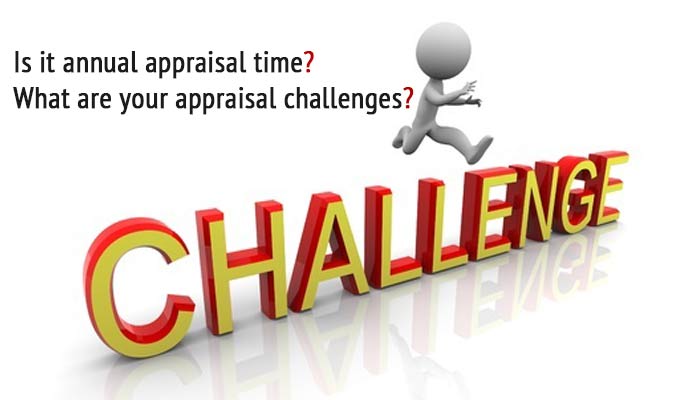A performance appraisal is a periodic evaluation of employees’ performance. An effective appraisal process encourages continuous feedback, training and praise to nurture workforce.
Before you go further, take a look at how John is appraised in a manual appraisal process.
“John is an intelligent and hard-working software developer in a mid-size organization. In the absence of an online performance evaluation system, his manager has been conducting yearly performance appraisals manually.
John has an exemplary six-year performance record, and is one of the top performing employees. In past years, John had informal manual appraisals where he got good ratings from his manager. Then one day, his manager left the organization.
A new manager was appointed for John’s team. Nothing much changed for John; he stayed determined to deliver exceptional results.
Before John and his team members could establish one-to-one relationship with their new manager, it was time for yearly manual appraisal. His manager didn’t get enough face time with the team members. No past performance evaluation records were available to him due to absence of an online review system. As a result, he was unable to provide accurate performance feedback.
On the other side, John was unaware of his shortcomings due to inconsistent feedback. He was confident of receiving good ratings in this year’s appraisal as well. In fact, he was excited for upcoming appraisal meeting with his new manager, knowing that he had sincerely achieved all the assigned goals and honestly completed self-evaluation process. The new manager conducted manual appraisal in an informal and casual way.
In the appraisal meeting, John’s manager directly handed over the completed appraisal form to him without considering his past achievements or having a discussion on his performance. On top of it, John wasn’t asked to explain his self-appraisal ratings and there wasn’t any discussion about his development goals.
John received satisfactory ratings and a minimal increase in compensation (of course, it was the lowest salary hike he received in past six years). He was disappointed for not receiving accurate ratings, feedback and recognition for his contribution. The new manager completely ignored the need to discuss John’s self-evaluation ratings that made him more upset. Both of them had different perceptions towards John’s yearly performance which created a wide gap in their professional relationship. After few days, John resigned from his job stating incompetent compensation and dissatisfaction in appraisal approach as the prime reasons.
John’s manager felt bad as he could not retain a top-performing employee in his team. He realized that the unavailability of an effective performance appraisal system has caused dismay for him and his team members.
It’s not only John, but there are millions of employees who dislike appraisal process because they face similar situations.
Do you want to know the other big challenges of a performance appraisal process? Here you go.
‘Once in a Year’ Performance Appraisal
Employees and managers need more frequent performance evaluations, goal planning and feedback discussions than annually. Having an annual appraisal process keeps managers away from constantly sharing their opinion on performance of their team members. Usually, employees need weekly or monthly feedback to remain focused towards their short-term yet important goals. It gives them the opportunity to get development coaching to improve quality of their contribution. Absence of regular performance feedbacks keep high performing employees unrecognized for their valuable contributions.
One-Way Appraisal Meeting
Unfortunately, when managers are unable to do any better in performance management, they tend to conduct annual performance appraisal meetings in a form of lecture where the manager becomes presenter and an employee becomes the listener. Appraisal meeting should always be a conversation, and not a one-way meeting. One-way meetings leave negative impact on employees. As a result, employees do not really care of hearing and following what managers preach.
Lack of Employee Development Opportunities
Employees look up to performance appraisals as an excellent opportunity to know their shortcomings and a platform to improve their skills and abilities. Employee appraisals fail if managers don’t focus on giving commitments for training opportunities.
Inability to Link Performance with Pay
What a big loss of opportunity if employers fail to attract top performers by not linking their appraisals with compensation! Employers should allow employees to know that rise in their pay is directly affected by appraisal results. If this happens, I am sure they would work hard to improve their performance year by year.
Coming back to the case discussed above, what do you think went wrong in John’s organization? Employees were distressed due to absence of clear goal setting, development opportunities and irregular manager feedback. In absence of a reliable employee performance appraisal tool, John’s new manager was not able to rate his team accurately which created dissatisfaction.
Today, most of the organizations are changing the way they conduct appraisals. The smooth shift from manual performance evaluation to an online performance appraisal has become a blessing for many organizations. Besides making evaluation easier, the cloud-based performance appraisal software helps HR and managers to –
- Identify top and low performers
- Ensure organizational alignment
- Accurate decision making
- Increase feedback frequency
- Improve performance tracking
- Identify training needs
What else is needed!
If you have been facing problems with your existing performance appraisal software or if you don’t have one, try using Empxtrack performance review system to push back appraisal challenges!








